10 Things We Didn't Know About Underage Drinking Prevention
Teachers have always played a leading office in underage-drinking prevention, but at what grade level? Research shows that communicating with students as early on as nine years old makes sense. Together, we can help kids commit to saying "aye" to a healthy lifestyle—before those challenging teen years hit.
Ask, Listen, Acquire's science-based digital resource give younger students a unique platform to acquire all well-nigh the developing brain and the office booze may play in their near future. Teachers use Ask, Mind, Acquire's lessons plans, worksheets, and videos to give a deeper agreement of what the brain does—and what alcohol does to it. This inquiry-backed strategy aims to influence how students bargain with disquisitional choices in the coming years.
Here, we break down 10 fascinating takeaways from Ask, Listen, Learn that teachers wisely utilize to brand sure their lessons on the topic pack a powerful prevention punch.
1. Kids are fix to talk about underage drinking prevention (and it's easier than everyone thinks).
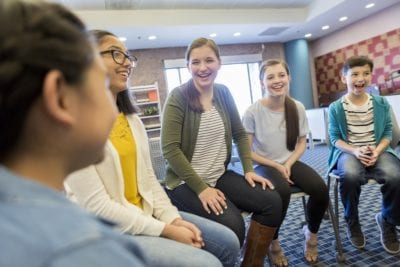
This is true whether you're the instructor, parent, or the student! While underage drinking might feel like a mature topic for late elementary school or center school students, you lot tin can go the conversation started comfortably with the correct approach. While three out of four families have talked to their kids nearly underage drinking at least one time in the last year, only nearly forty percent of those families focused on encephalon evolution. It'southward a key strategy teachers can deploy in the endeavour to teach kids about the effects of underage drinking.
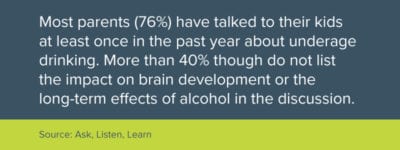
two. A tween's brain is their head coach. And it's just getting started coaching the team.
[embedyt] https://www.youtube.com/sentinel?five=7x6HUNTnXUw[/embedyt]
When students dig deeply into the ins and outs of the touch their brain has on the remainder of their torso, physical, mentally, and emotionally, their optics may widen, and their mouths may drop! Understanding that their encephalon isn't fully developed until their twenties is a powerful realization—and 1 of many facts they'll repeatedly refer to when faced with the choice to drink.
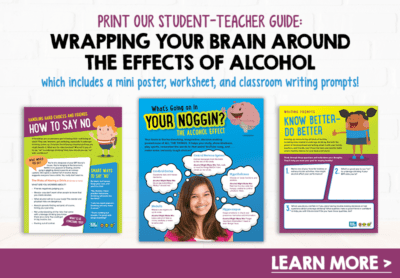
iii. Valuing a healthy trunk prevents underage drinking.
Thinking about healthy living gives students the chance to think broadly. At this age, students are beginning to care more passionately about what they eat, recognize that movement matters, and pay attention to how they're dealing with large emotions. They discover an appreciation for how everything works together toward a well-lived life—and their healthy choices affair for the all-time issue.
4. Nine- to 12-twelvemonth-olds face real peer pressure, too.
It may not be subsequently-school-special material just nevertheless, but the CDC reports that this age is a disquisitional time for kids. They start to grade stronger, more than complex friendships. They as well become more than aware of their bodies, as puberty begins, and become more contained. Agreement and communicating these challenges in schoolhouse and at abode is key.
That said …
five. In that location'southward (thankfully) more than one way to say "no" to alcohol.
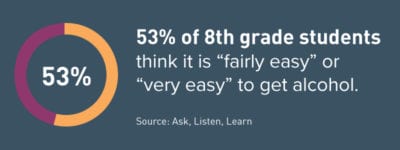
Ix- to 12-year-olds may be faced with underage drinking choices before we realize information technology. They need options to communicate with their peers. In that location'southward non a 1-size-fits-all approach to handling a peer-force per unit area underage-drinking situation. Kids gravitate to what makes sense for their friend group. They also thrive when given a variety of strategies that will piece of work for their own personality and in specific situations. Do they need to be blunt and direct or somehow divert the offering clearly? Students tin can notice their vocalisation to say "no" in a fashion that makes the most sense to them.
6. Younger students should think nigh mentors now.
Edifice a solid support organisation, exist information technology composed of teachers, their parents, coaches, or like-minded friends, is empowering for middle school–historic period kids. They're edifice their circle of trust. The more we talk to them, the more they'll talk back (in the most respectful way, of form!).
7. Underage drinking prevention is a squad try.

Parents are your partners—and that'southward true if you lot're the teacher or the pupil in the underage-drinking equation. Research shows that parents are the leading influence on a pupil'southward determination to drinkable alcohol and understanding of the consequences that come with that choice. Students at this historic period may not say it, but they want to experience supported. A letter home to parents volition encourage family support and also support the evolution of a full-circle partnership to get kids to say "yes" to their wellness.
viii. Students observe developed behavior more than we may know.
Young students mirror what parents and teachers do, whether they would admit to that or not! Leading by example is key. And so, the adults in their lives have a great opportunity to showcase certain behavior, similar planning who will drive home from a party, serving nonalcoholic-potable options, or hosting enjoyable social alternatives that don't include booze.
9. Setting goals gives students the opportunity to persevere.
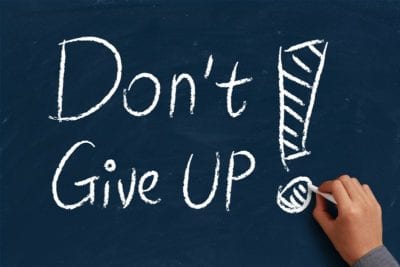
Students face challenges academically and socially daily at this age. Learning to set up and commit to personal goals teaches them not to give up (or give in!) when their values are questioned. Whether that's homework, exercise, or issues with friends, talking and writing most what they desire to attain helps their long-term ability to say "yep" to a salubrious lifestyle.
ten. Large picture? All conversations are important. Ask, Listen, Learn!
Teaching underage-drinking-prevention curriculum opens up the classroom to talk about emotions and other adolescent challenges more than easily. And so stay positive and authentic by asking questions with open-ended answers. What are they passionate most? Exercise they worry about their fears? How do they encounter their futurity? Your conversations empower them to make all kinds of smart, healthy choices!
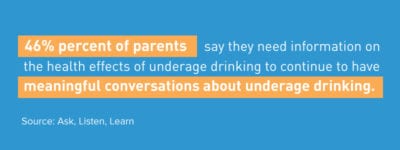
Check out our student-teacher guide, "Wrapping Your Brain Effectually the Effects of Alcohol" which includes a mini poster, worksheet, and classroom writing prompts!
Ask, Listen, Acquire is a FREE underage drinking prevention programme for kids ages ix-12 and their parents and educators. It is complete with lesson plans, worksheets, and videos, and is aligned to national standards. Detect out more!
Source: https://www.weareteachers.com/underage-drinking-prevention/
0 Response to "10 Things We Didn't Know About Underage Drinking Prevention"
Post a Comment